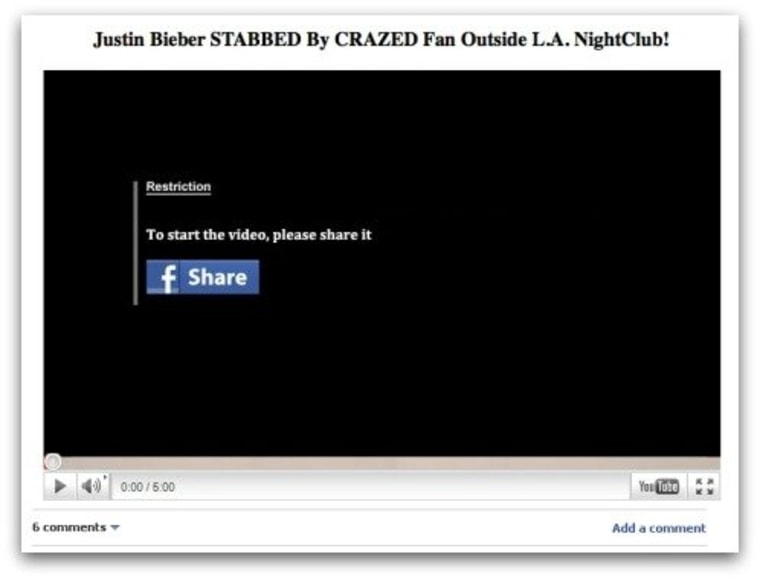I don't care what Justin Bieber claims in songs, I'm convinced that all he wants for Christmas is to get through a week without having to see any Facebook scams involving his name.
Sophos reports that the latest Bieber-themed scheme involves Facebook posts proclaiming that the teen-pop sensation was stabbed by a "crazed fan" while visiting either a New York City or Los Angeles nightclub. The posts include a thumbnail-sized photo of an unknown individual's sliced up back and a link to a site which one would assume offers more information about the incident.

Unfortunately the linked site doesn't offer any details about the stabbing — which of course did not actually occur — and instead just leads curious Facebook users to something that looks like a YouTube video.

But appearances are very deceiving, because that YouTube video isn't even a video. Instead it is a way to trick folks into sharing a link and taking a survey — by suggesting that they will see a footage of the stabbing if they follow some instructions.
And every time someone does all of those things? A scammer smiles because his or her bank account gets a couple of pennies heavier, as Sophos explains:
The scammers earn commission for every survey they manage to trick users into taking. They are only using the claim that Justin Bieber has been stabbed to try to lure as many people as possible into spreading their link, and taking their money-making surveys.
So what can you do to avoid spreading scams like this?
Think twice before clicking a link you discover in your News Feed — is the friend who shared it really the type who would "like" a thing like that? — and keep an eye out for peculiar pop-ups, prompts which demand that you fill out surveys or share links before you can view a video, and similar oddities.
And if you get suckered into a scam like this despite being careful? It's OK, it happens to the best of us. But there are a few things you should do:
- Check the security settings on your Facebook account. Did you really authorize all the apps and websites which are interacting with your Facebook account? No? Take access away from the ones which look unfamiliar.
- Look at your News Feed. Are there things or links which you don't recall liking listed? Are there posts and status updates which you didn't write? Get rid of them before your friends see them and get scammed, too.
Related stories:
- Facebook scam claims Lady Gaga is dead
- Amy Winehouse death video scams hit Facebook
- Woman fights to put Effin on Facebook
Want more tech news, silly puns or amusing links? You'll get plenty of all three if you keep up with Rosa Golijan, the writer of this post, by following her on Twitter, subscribing to her Facebook posts, or circling her on Google+.